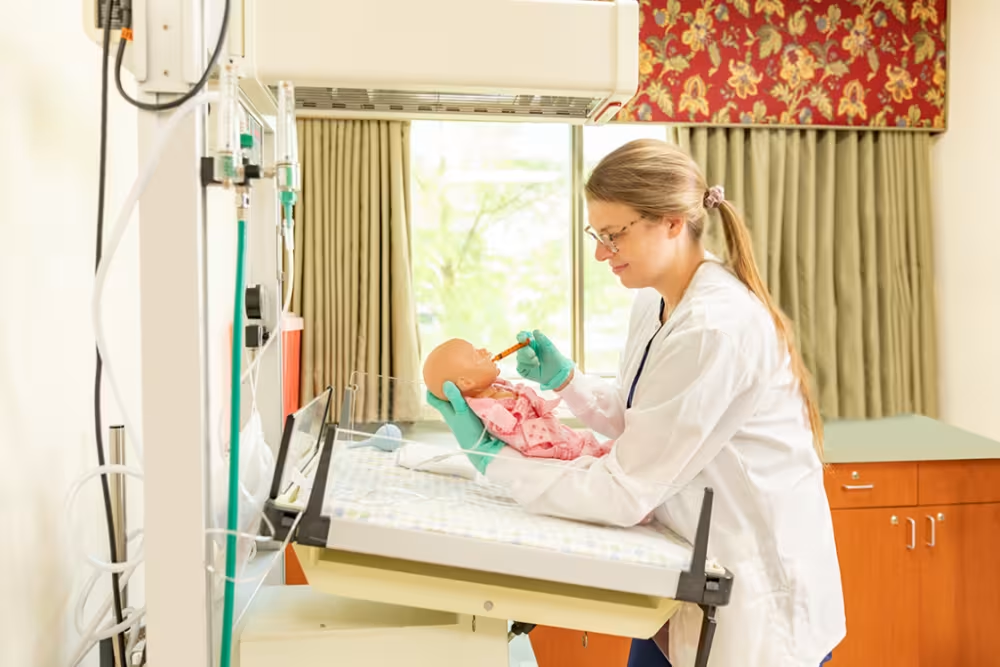Neonatal Nursing: How to Become a NICU Nurse
If providing intensive care for newborns in the hospital sounds exciting, you might be interested in pursuing neonatal nursing. This is a nursing specialty in […]
Each blog post is dated and contains accurate information as of that date. Certain information may have changed since the blog post publication date. If you would like to confirm the current accuracy of blog information, please visit our ABSN overview page or contact admissions at 866.892.6463.
At Marian University, students are prepared to begin their neonatal nursing career. As a neonatal nurse, you will provide essential medical care to newborns while supporting their families. To become a neonatal nurse, you will need to earn a nursing degree, an RN license, and certifications while gaining experience.

If providing intensive care for newborns in the hospital sounds exciting, you might be interested in pursuing neonatal nursing. This is a nursing specialty in which nurses care for newborns during their time in the hospital, most commonly from birth to 28 days. Neonatal nurses play a critical role in stabilizing infants, supporting families, and ensuring that babies receive the best possible care. Because this is a specialized role, most neonatal nurses first gain experience in pediatric or labor and delivery roles and may earn certifications before entering the NICU.
With Marian University’s Accelerated Bachelor of Science in Nursing (ABSN) program, you will gain all the foundational knowledge and skills needed to begin your nursing career. Through a curriculum delivering online coursework, labs, and clinical rotations, you can earn your nursing degree in as few as 16 months if you have a non-nursing bachelor’s degree or at least 30 non-nursing college credits with a cumulative GPA of 2.0 or higher.
What is Neonatal Nursing?
Neonatal nursing focuses on the care of newborns. The neonatal period is defined as the first 28 days of life, but some patients need care for longer. Neonatal care is common for those born prematurely, with low birth weights, congenital disabilities, or other complications requiring intensive medical treatment.
A neonatal nurse’s primary focus is stabilizing and supporting premature and full-term infants with critical conditions, including respiratory distress, cardiac issues, or infections. A neonatal nurse will provide compassionate care with confidence to each newborn while providing updates and emotional support to families and parents.
Most neonatal nurses work in NICUs, but they can also be found in delivery rooms, postpartum units, and pediatric clinics.
Neonatal nursing combines technical skills with compassion, as these nurses deliver life-saving interventions while providing emotional support to families navigating a difficult time.
What Do NICU Nurses Do?
NICU nurses play a vital role in multidisciplinary healthcare teams dedicated to caring for newborns who need intensive medical support. Their responsibilities vary depending on the NICU level, from Level I (well-baby nurseries) to Level IV (specialized centers).
A neonatal nurse’s key responsibilities may include:
- Administering medications and treatments, including IV fluids, surfactant therapy, and nutrition through feeding tubes.
- Collaborating with physicians and working alongside neonatologists, respiratory therapists, and other specialists to implement individualized care plans.
- Monitoring vital signs by closely observing oxygen levels, temperature, heart rate, and blood pressure.
- Operating specialized equipment, like managing ventilators, incubators, and infusion pumps with precision.
- Supporting families by educating and counseling parents on their baby’s condition, progress, and care at home after discharge.
Neonatal nurses care for newborns classified across four levels of care, based on support, stability, and essential medical attention. As the levels increase, the intensity of medical care and support also increases. These include:
- Level I: Basic newborn care for healthy infants
- Level II: Intermediate care for moderately ill or premature babies
- Level III: Intensive care for critically ill or very premature newborns
- Level IV: The most advanced level—offering complex surgical and medical care
How to Become a Neonatal Nurse
Becoming a neonatal nurse involves both education and experience. Most NICU nurses begin as registered nurses (RNs) and then gain specialized training in neonatal care.
1. Earn a Nursing Degree
The first step to becoming a neonatal nurse is earning a degree. You can become a licensed registered nurse with a nursing diploma, an Associate Degree in Nursing (ADN), or a Bachelor of Science in Nursing (BSN).
Many employers now prefer or require BSN-prepared nurses, particularly for NICU positions. As a neonatal nurse, you will care for critically ill babies who need intensive medical support. Earning a BSN will equip you with an essential foundation for this important job.
Accelerated BSN (ABSN) programs like ours in Indianapolis, Indiana, and Nashville, Tennessee, are ideal for students who want to enter nursing faster. In Marian’s ABSN program, you can earn your nursing degree in as few as 16 months, as long as you meet admissions requirements. In addition to our regular admissions pathway, we also offer a transfer pathway for students who have earned at least 30 non-nursing college credits with a cumulative GPA of 2.0 or higher. All students admitted to the ABSN program follow the same curriculum.
In this program, the online coursework gives you valuable nursing knowledge with the flexibility of completing your work on your own timetable, provided you meet deadlines. You will gain practical nursing knowledge through skills and simulation labs at our program sites in Indianapolis, Indiana, and Nashville, Tennessee, as well as clinical rotations at our partner hospitals in each city.

Learn more about how to become a nurse fast with an ABSN program.
2. Obtain RN Licensure
After you earn your nursing degree, you will need to pass the NCLEX-RN exam to become a licensed registered nurse. This comprehensive exam ensures you possess all the necessary knowledge and skills to become a successful nurse.
This credential allows you to practice as a nurse and apply for entry-level nursing positions.
3. Gain Experience in Neonatal or Pediatric Units
New nurses often start in postpartum, pediatric, or labor and delivery units before transferring into NICU roles. Gaining experience will help you to learn all the necessary skills and procedures before entering a NICU role.
Many hospitals offer nurse residency programs, or preceptorships where you will be paired with an experienced nurse mentor as you start as a practicing RN. Delivering neonatal care with oversight as a new nurse will further build your skills and confidence.
Nurses may need a minimum amount of clinical experience before being considered for NICU roles. For most NICU nursing roles, you will need at least two years of experience working in a clinical setting.
4. Pursue Certification
You may need to earn specific certifications before entering a NICU role. Certifications demonstrate advanced expertise and can enhance job opportunities. A few of these certifications include:
- RNC-NIC (Neonatal Intensive Care Nursing) – offered by the National Certification Corporation (NCC)
- Neonatal Resuscitation Program (NRP) – required in most NICU settings
- Critical Care Registered Nurse (CCRN-Neonatal) – offered by the AACN for advanced neonatal nurses

Essential Skills for NICU Nurses
NICU nursing demands both technical expertise and emotional resilience. Successful neonatal nurses possess a unique combination of skills.
NICU Nurse Technical Skills
As a neonatal nurse, you will need experience with the NICU equipment and environment. You will need expertise in areas such as ventilator management, neonatal pharmacology, and IV therapy.
In addition to expertly managing equipment, you must be able to proficiently interpret lab results and recognize subtle signs of distress, as even a small change in your patient’s condition can be telling.
Since you are caring for critically ill newborns with weak immune systems, you will need to be able to implement strong infection control and emergency response capabilities.
NICU Nurse Soft Skills
As a neonatal nurse, you will support families going through difficult seasons full of stress and grief. A neonatal nurse must have a great deal of compassion and empathy for the families and friends of each patient.
Due to the nature of the role, you must also have emotional endurance and stamina to remain composed under pressure.
You must also have a strong attention to detail because even tiny changes in a newborn’s condition can be critical.
As a healthcare professional, communication skills are important. But as a neonatal nurse, you must have especially strong communication skills to effectively collaborate with other healthcare teams and educate parents about your newborn patient’s condition and needs.
Neonatal Nurse Salary and Job Outlook
According to the Bureau of Labor Statistics, the annual median wage of a registered nurse was $93,600 as of May 2024. Nursing specialties like neonatal nursing have the potential for higher income because of the specialized and intensive nature of the role.
NICU nurses are especially needed in large hospitals and urban medical centers with advanced neonatal units.
NICU nurses can grow into roles such as charge nurse, nurse educator, clinical specialist, or neonatal nurse practitioner. Because you gain valuable experience as a neonatal nurse, you will possess many important skills needed for other nursing roles.
Pursuing ongoing education and certification can open doors to leadership and teaching positions. This is a great option if you are passionate about educating others in the nursing field.
Start Your Nursing Journey With Marian ABSN
At Marian University, you will be well prepared to enter the nursing workforce and pursue opportunities in neonatal nursing or any other practice area. With comprehensive online coursework, practical labs and simulations, and clinical rotations, you will learn all the basic knowledge and skills to begin your nursing journey.
Contact us to learn more about Marian University’s ABSN program today.

